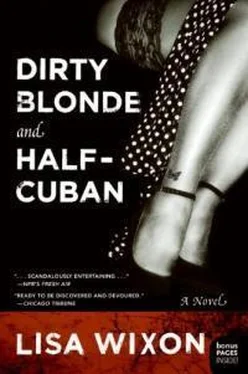Lisa Wixon - Dirty Blonde and Half-Cuban
Здесь есть возможность читать онлайн «Lisa Wixon - Dirty Blonde and Half-Cuban» весь текст электронной книги совершенно бесплатно (целиком полную версию без сокращений). В некоторых случаях можно слушать аудио, скачать через торрент в формате fb2 и присутствует краткое содержание. Жанр: Современная проза, на английском языке. Описание произведения, (предисловие) а так же отзывы посетителей доступны на портале библиотеки ЛибКат.
- Название:Dirty Blonde and Half-Cuban
- Автор:
- Жанр:
- Год:неизвестен
- ISBN:нет данных
- Рейтинг книги:4 / 5. Голосов: 1
-
Избранное:Добавить в избранное
- Отзывы:
-
Ваша оценка:
- 80
- 1
- 2
- 3
- 4
- 5
Dirty Blonde and Half-Cuban: краткое содержание, описание и аннотация
Предлагаем к чтению аннотацию, описание, краткое содержание или предисловие (зависит от того, что написал сам автор книги «Dirty Blonde and Half-Cuban»). Если вы не нашли необходимую информацию о книге — напишите в комментариях, мы постараемся отыскать её.
Dirty Blonde and Half-Cuban — читать онлайн бесплатно полную книгу (весь текст) целиком
Ниже представлен текст книги, разбитый по страницам. Система сохранения места последней прочитанной страницы, позволяет с удобством читать онлайн бесплатно книгу «Dirty Blonde and Half-Cuban», без необходимости каждый раз заново искать на чём Вы остановились. Поставьте закладку, и сможете в любой момент перейти на страницу, на которой закончили чтение.
Интервал:
Закладка:
57
C amila’s house isabuzz with family and neighbors as I burst through the door, my address in hand, my breath having run out on me. Tito is barking in the excitement, and I scoop him up.
“Well, if it isn’t Matías Pérez!”
Two centuries ago, a man named Matías Pérez tethered sheets and silks to a basket and set off from the Malecón pumping hot air into his makeshift balloon. A crowd assembled and watched, in astonishment, as his strange contraption elevated. No traces of Matías Pérez or his hot-air balloon have ever been found. Some swear he will one day soar from the sky and recount the tales of his devilish ride.
But today it’s Camila who’s swooped in from the clouds. Beaming in gold jewelry and a new baby-pink Valentino suit, my amiga locatells of her adventure amid the chatter and din.
She floated on the clouds all right. She floated on a plane chartered by her Syrian sweetie Farouk, who whisked her off to Damascus. Farouk’s father had been in need of triple-bypass surgery and, as a friend of the Cuban government, Farouk arranged for the talented Camila to perform the operation on his father, a high-ranking Syrian. For security reasons, Camila explains, she hadn’t been allowed to tell anyone of her whereabouts.
“ Oye,it was a private plane,” gossips Camila, drawing coñosand mentirasfrom the crowd. “We stopped for fuel in Paris.” Everyone’s eyes are shining now. “I saw the Eiffel Tower!”
“Are you going to marry him?” asks someone.
“Will you move to Damascus?” asks another.
Camila shakes her head in horror. “Heavens no. I’d never live there. Women have no rights.” She leans in. “I was the only woman surgeon in the entire hospital!”
The neighbors find this incredible. Later, Camila pulls me aside. “It was the worst trip ever,” she says. “I didn’t want to worry my family but…Except for the surgery, mi vida,it was a disaster.”
“What happened?” I ask, stepping farther into the back of the house.
“Farouk was totally different from the way he is here. Telling me how to dress, what to eat. Horrible. I hated it.”
“He dumped you, didn’t he.”
“Like a rotten mango.” She shakes her head and sighs, and I give her a big bear-hug. It may be the first time on record Camila has suffered a romantic rejection. Later on, over Hemingway daiquiris, I commiserate with her about her loss, and we share the joy of my procured address.
Camila wipes her nose. “Alysia, at first when I met you I befriended you out of charity. But now…You are so important to me. I know you can’t promise me, but could you at least pretend you’ll never leave?”
I’ve less than two months before I’m permitted to return to Washington, and the idea of staying here is about as appealing as the doughy, half-baked peso pizza sold on nearly every street. But I don’t tell her so.
CALLE M, NUMBER 3051.
I keep the cardboard as a talisman, for luck, but the address Victor gave me several days before is burned in my memory.
I don’t have the guts to go there. If it’s not my father’s house, I’m back where I began nearly one year ago, living like a local, without benefits but with every stitch of their heartaches.
I want to keep this moment alive, this moment before everything changes. If it’s not the house, if it’s another dead end, then I’ve little choice but to return home defeated. If it’s the right house, then the scenarios are too numerous to settle. My father could be irritated. He could be disbelieving. He could be dead.
Camila comes to Calle M with a bowl of chicken and black beans, and plops it down on my lap. She orders me to eat; I beg her to whisper. She shakes her head and arranges herself in the bushes. We’re across from No. 3051, in the darkness. I’ve been watching the comings and goings for several days now. I’m driving her crazy.
“How long are you going to do this?” she asks. I shrug.
The island is buzzing over the rumor of an American attack: storing food, boiling water, calling family. The madness affords me solitude, to sit undetected in the foliage across the street. I watch the house, a sprawling two-story colonial with faded yellowy paint, in Vedado—once the forbidden hinterlands of Havana—and just six blocks from the hospital where I was born.
Thus far, the residents I’ve detected include a grandmother, several baseball fiends under age twelve, and five or six adults, including one attractive man my age with a sizzling boyfriend.
“You know, I’m so happy I went abroad,” says Camila, scratching Tito behind the ears. “It’s the one thing I’d always wanted to do. Now I know I’d never live anywherebut mi patria.”
“My mother didn’t want to leave, either,” I say, peering intently at the house.
“ Mentira!She wrote that in her books?”
I nod, shooshing her with a finger to my lips.
“She seems like a very sad woman to me,” says Camila, choosing her words. “She didn’t listen to herself very carefully.”
“Morty gave me a thousand bucks,” I whisper, changing the subject. “I can pay you back now.”
“Did he whip out his, what does he call it, his ‘nambycane’?”
I nearly howl at the visual, but cover my mouth. “No, thank God. He swears you’re his only mamacita.” Camila laughs, but I quiet her as another boy leaves the bustling No. 3051.
Suddenly serious, she asks: “ Mi vida,what are you going to do if you do find your father? Will you return to the U.S.?”
“Do I have a choice?”
Camila answers with a raised eyebrow and a shrug. Her mouth settles tightly, suggesting she’s biting her tongue. She pulls Tito into her lap and tries to get comfortable next to me, and the two of us sit for what seems like hours, watching and waiting.
A mango tree grows like a merry weed on the side of the house. Kids from the neighborhood steal the green fruit and whack them with sticks to the outfield. Duct tape X’s serve as bases. It’s a happy, chattering, clamoring brood, and I hope to God they’re mine.
“You have to just go,” says Camila, pleading with me. “I can’t stand watching you watch them. You’re building your expectations too high.” I know she’s right, but I can’t do it. Every older man who walks in the door makes my heart stop cold.
58
W hite slips ofpaper flutter on the main doors of Havana’s houses. People look to the sky, waiting for bombs.
Camila tells me the white paper means the military is welcome in that house, its owners having agreed to feed and shelter soldiers during an attack. An attack. It’s all they talk about now, in these days after May Day, after a speech raising the ire of the island.
There’s no way to confirm if it’s just hype, if the U.S., a country with a powerful Cuban constituency, would attack an ancestral land. When I say I don’t think so, that the fear is fed by propaganda, a way to make people forget crackdowns and dissidents, no one seems to listen.
Despite my Cuban blood, the U.S. passport I carry makes me untrustworthy now. They say they love the people in the U.S., that it’s the government they loathe, but I feel misplaced nonetheless. No matter how local I feel, earning my way like many Cuban women, I’m still an extranjera,a foreigner. My paperwork says I may leave in a few short weeks. And that makes all the difference.
I’m awakened late at night by Rafael. I’m thrilled to see him, it’s been two weeks now, but he’s cold and curt. He leaves his 1956 Chevy on idle and stands at my door. I reach for the heirloom gold cross that hangs around his neck and caress it between my fingers. I must have phoned him twenty times.
“You’ve forgiven me?” I ask, feeling ashamed.
Читать дальшеИнтервал:
Закладка:
Похожие книги на «Dirty Blonde and Half-Cuban»
Представляем Вашему вниманию похожие книги на «Dirty Blonde and Half-Cuban» списком для выбора. Мы отобрали схожую по названию и смыслу литературу в надежде предоставить читателям больше вариантов отыскать новые, интересные, ещё непрочитанные произведения.
Обсуждение, отзывы о книге «Dirty Blonde and Half-Cuban» и просто собственные мнения читателей. Оставьте ваши комментарии, напишите, что Вы думаете о произведении, его смысле или главных героях. Укажите что конкретно понравилось, а что нет, и почему Вы так считаете.












